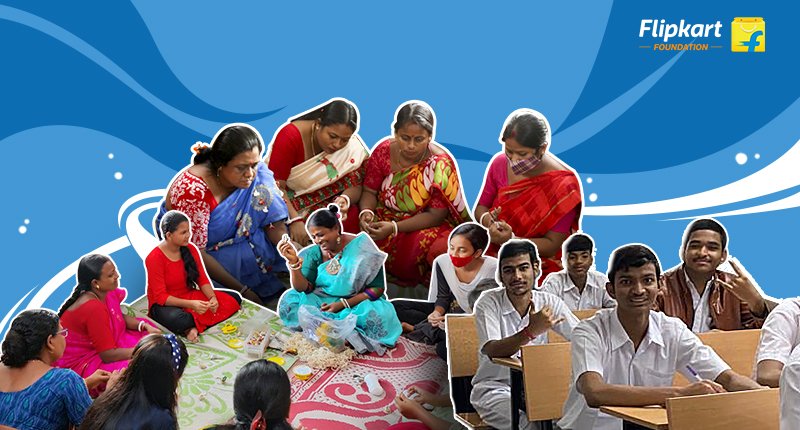
From small village workshops to online marketplaces, Flipkart’s CSR is turning ideas into action and creating change across India.
Flipkart’s Corporate Social Responsibility (CSR) is not just a corporate mandate — it’s a movement across India to drive sustained change. Through the Flipkart Foundation and flagship initiatives such as Flipkart Samarth, the company has supported thousands of women entrepreneurs, established over 70,000 rural digital service centers, and collaborated with NGOs to enhance education and healthcare in communities that need it most.
From training women in Gurugram to run small businesses, to helping artisans in Lucknow sell eco‑friendly jute bags across India, and equipping ASHA workers with digital tools, these initiatives are not just projects — they are stories of transformation, resilience, and opportunity.
The Big Change in Numbers: How Flipkart Turned Barriers into Breakthroughs
The effect of Flipkart’s CSR can be quantified in figures, but the story lies behind the numbers. Women who had no formal employment opportunities are now managing thriving digital centers. Rural vendors who were anonymous in the online space are now selling across the country. Young students in far-flung schools are studying coding and robotics, while small-scale producers are embracing sustainable approaches and reaping consistent orders.
| Focus Area | Before | After |
| Women’s Livelihoods | Few rural women in formal jobs | 70,000+ women running digital centres, earning ₹12k–₹15k/month |
| Digital Inclusion | Rural sellers are invisible in e‑commerce | Nationwide reach via Flipkart Samarth, 80%+ internet penetration in target areas |
| Education & Skills | Outdated curricula, low STEM exposure | 300+ STEM labs, 85%+ digital literacy in supported schools |
| Sustainable Supply Chains | <10% local sourcing, high plastic use | 40%+ local sourcing, 100% sustainable packaging in key categories |
Before & After: From Quiet Struggles to Loud Success Stories
Before these programs, rural women had few financial opportunities and no voice in local affairs. Farmers and artisans were only able to sell locally at fairs, which kept their income low and exposure limited. Students in rural schools lacked modern technology, and small businesses found it difficult to expand using ungreen packaging.
Women today operate successful online hubs, mentor others, and occupy leadership positions in their respective communities. Rural sellers reach customers across India with Flipkart’s logistics and digital payment systems. Students are learning coding, design, and competing in national innovation challenges. Local producers now enjoy steady demand, eco‑friendly packaging, and higher earnings.
Flipkart Foundation: Turning Good Intentions into Life‑Changing Action
Launched in 2022, the Flipkart Foundation leads the company’s social work, focusing on education, healthcare, and livelihoods. It partners with NGOs like Ashray Akruti to help children with hearing disabilities through hearing aids, speech therapy, and training — enabling over 250 children to join regular schools and colleges.
In Gurugram, women are trained to make and sell soap, creating steady income streams and building confidence. In healthcare, over 10,000 ASHA and Anganwadi workers now use tablets and mobile apps to deliver better services in their communities, making healthcare more accessible and efficient.
| Focus Area | Example Initiative | Reach/Impact |
| Education | Ashray Akruti partnership for children with disabilities | 1,000+ children supported |
| Livelihood Creation | Soap‑making training for women in Gurugram | 200+ women empowered |
| Healthcare | Digital tools for ASHAs and Anganwadi workers | 10,000+ frontline workers supported |
Flipkart Samarth: From Village Craft Tables to India’s Online Shopping Carts
Flipkart Samarth connects artisans, weavers, and small entrepreneurs — especially women — to a national online marketplace. In Lucknow and Barabanki, Anjali Singh’s Jute Artisans Guild has trained hundreds of women to make eco‑friendly jute bags, replacing plastic and earning national awards.
Since its launch, over 1.5 million products from Samarth partners have been sold online, reaching customers in more than 20,000 pin codes. For many women, this has meant moving from seasonal, uncertain earnings to a steady, dignified income.
Digital India with a Gender Focus: Training Women to Lead the Tech Revolution
Flipkart supports the Digital India mission by helping women gain digital skills and leadership roles. Women trained under PMGDISHA now operate more than 70,000 Common Service Centres spread across India, offering government services, digital payments, and e-commerce onboarding.
Within the organization, diversity initiatives are mentoring women for leadership roles, equipping them with the abilities and self-assurance to take charge in the digital economy. National statistics indicate that although 89.8% of young rural women have accessed the internet, just 51.6% of them own a mobile phone — a gap Flipkart is bridging by giving them devices and training.
Latest Impact: Women at the Frontlines of India’s Digital Transformation
In its latest CSR push, Flipkart has sharpened its focus on women‑led digital inclusion. More than 70,000 women now operate Common Service Centres, delivering essential services and connecting rural communities to the digital economy. Women artisans are selling nationwide, replacing plastic with eco‑friendly products. ASHA and Anganwadi workers are using tablets and apps to improve healthcare and nutrition delivery.
New mentorship programs are preparing women for leadership roles in tech, logistics, and social enterprise — ensuring they are not just participants but leaders in India’s digital future. This shift is helping close the gender gap in technology by turning women into digital creators and service providers, not just users.
Why It Matters: A Game Plan for a Stronger, Fairer, More Connected India
Flipkart’s CSR is not just charity — it’s a strategy to bring lasting change. Empowering women, bridging rural India, and providing equal opportunity, it’s building a stronger, more inclusive country. The combination of talent, technology, and marketplace access is changing lives and building a future where opportunity is not defined by geography or gender.
FOR MORE BLOGS – beyondthepunchlines.com

 Add to favorites
Add to favorites





